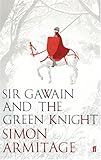 I enjoyed the Radio 4 version of Simon Armitage’s Gawain and the Green Knight over Christmas. A lot of actors tend to (over)act poems rather than read them, but I thought Ian McKellen and the other performers made a pretty good job of it. And the sound effects were atmospheric without intruding too much on the verse.
I enjoyed the Radio 4 version of Simon Armitage’s Gawain and the Green Knight over Christmas. A lot of actors tend to (over)act poems rather than read them, but I thought Ian McKellen and the other performers made a pretty good job of it. And the sound effects were atmospheric without intruding too much on the verse.
The BBC could have given advance notice that they were broadcasting an abridged version – instead of the stately scene-setting of the Christmas feast in the original, the Green Knight fairly galloped on stage within a couple of stanzas, and the ‘fast forward’ button was pressed several more times – but I got used to that and was soon lost in the story.
Armitage was right to say (in his Guardian article) that a translation melts the “thin coat of ice” that lies between the original poem and a modern reader (or listener). Unless you’re an expert in Middle English (which I’m not) the language barrier inevitably slows you down, whereas a translation allows you to canter through the poem at the same speed as a its first audience. Which gave me a fresh sense of what a marvellous storyteller the Gawain-poet was – it’s a tale you can return to again and again and find new meanings. (Here’s a blog with some interesting reflections on the symbolism of the tale.)
Good as the production was, I’d still like to hear Armitage read the translation himself, in a studio hidden away from the BBC special effects department. Poems have sound effects built in – the poet didn’t take all that trouble over the alliteration and rhyme for nothing. And one of the things that attracted to me to Armitage’s version was the Guardian piece where he describes himself as “a northerner who not only recognises plenty of the poem’s dialect but detects an echo of his own speech rhythms within the original”. I was also intrigued by his description of hearing McKellen read the poem in the studio:
I went along to listen, and sitting in the studio in Manchester before he opened his mouth, I suddenly realised that for all my convictions about the importance of the human voice in this poem, I’d never heard a word of my translation spoken out loud. The voices, up to this point, had all been in my head.
This offers an interesting glimpse of Armitage’s writing process. With a long poem like this where the alliterative effects are such a prominent feature of the soundscape, I’d assume he’d have read at least some of it out loud, to test it out. Apparently not.
Ian McKellen gives his own take on the recording here.
It looks as though the recording has disappeared from the BBC website – if anyone finds it online, please let me know and I’ll post a link here.
Very glad to have been involved in this recording. Have you come across the site
http://www.poetcasting.co.uk
which is also building up a library of recordings by published and emerging poets?
I’ve just recorded for Poetcasting. It’s run by a remarkable student at Leicester University, Alex Pryce, with a NESTA grant and advice from the Poetry Society. Alex is hoping to record lots more poets. She is enthusiastic and efficient, and her recording equpment is first class. I recommend her. Would-be recorders can get in touch with her via the website.
Very best wishes to Magma and all who sail in her!
Alison
Thanks Alison, that’s an excellent site! Look forward to exploring it.
Lovely site Mark !
Could easily spend hours browsing and reading…from a fellow poet.
Thanks Janete, I just wish I had more time to write it at the moment… yours looks cool too.